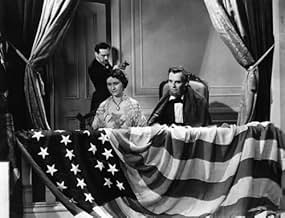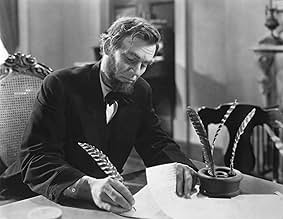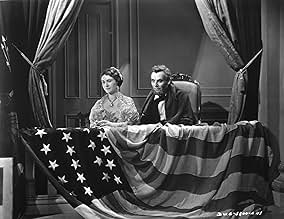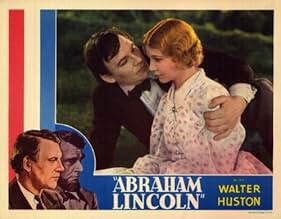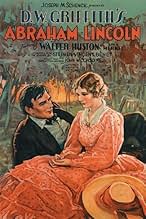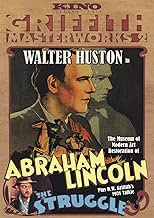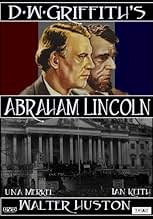IMDb रेटिंग
5.7/10
1.8 हज़ार
आपकी रेटिंग
अपनी भाषा में प्लॉट जोड़ेंAn episodic biography of the 16th President of the United States.An episodic biography of the 16th President of the United States.An episodic biography of the 16th President of the United States.
- पुरस्कार
- कुल 4 जीत
William L. Thorne
- Tom Lincoln
- (as W.L. Thorne)
Edgar Dearing
- Armstrong
- (as Edgar Deering)
Jason Robards Sr.
- Herndon
- (as Jason Robards)
Cameron Prud'Homme
- John Hay - Secretary to the President
- (as Cameron Prudhomme)
James Eagles
- Young Soldier
- (as Jimmie Eagle)
फ़ीचर्ड समीक्षाएं
I think it qualifies as a must-see film for all true scholars of the cinema. That is not to say that it is a good film. It is most certainly not. But this is really a perfect film in which to study the biggest change that this artistic medium ever experienced, the change from silence to sound. The whole film comes off as so, so awkward. It doesn't help that the script is awful. The film is actually over-ambitious, trying hard to cover the entire life of Abe, from birth to death. However bad Abraham Lincoln is, though, I myself found it more than watchable and always fascinating. 6/10.
If Griffith had stuck to Lincoln's personal life, this could have been an interesting, amusing, and occasionally insightful film. Griffith gives us a multi-layered and largely accurate portrait of Lincoln the man. We see the ungainly country lawyer, countrified in speech and manner, often serious, even melancholy, but with a rare ability to find humor in the most unlikely places and to laugh even at himself. We see Lincoln the inveterate story-teller, the insomniac, the doting father, the determined commander-in-chief the patient husband. If this had been the whole of the film, it would have been easy to overlook its painfully outdated style and to forgive its frequent omissions and exaggerations as poetic license.
Unfortunately, the film necessarily includes Lincoln's political life, and here it moves from poetic license to outright falsehood. Slavery was the central issue of Lincoln's political career, a fact that Griffith tries to obscure, going so far as to turn Lincoln's pivotal 'House Divided' speech into an argument against secession. This is particularly ironic since it was really Lincoln's battle cry against encroaching slavery. When South Carolinians seceded two years later, this was the speech they pointed to as proof that when Lincoln took office, "the slaveholding States will no longer have the power of self-government ... and the Federal Government will have become their enemy."
During Lincoln's presidency, the question of slavery occupied much of his time and attention, yet again Griffith chooses to ignore it. His Lincoln spends more time admiring the courage of Confederate soldiers than worrying about slavery. Even the Emancipation Proclamation gets only the briefest attention. Lincoln reads a line from the document, signs it, and says, "Well, gentlemen, it is done." It's oddly dismissive, coming from a man who considered emancipation the central act of his presidency and the most meaningful act of his life.
Denied his opposition to slavery and concomitant commitment to democracy and the inalienable rights of man, Lincoln is reduced to endlessly repeating, "The Union must be preserved." Why it must be preserved is left to the audience's imagination. The film never gives us the slightest clue.
Unfortunately, the film necessarily includes Lincoln's political life, and here it moves from poetic license to outright falsehood. Slavery was the central issue of Lincoln's political career, a fact that Griffith tries to obscure, going so far as to turn Lincoln's pivotal 'House Divided' speech into an argument against secession. This is particularly ironic since it was really Lincoln's battle cry against encroaching slavery. When South Carolinians seceded two years later, this was the speech they pointed to as proof that when Lincoln took office, "the slaveholding States will no longer have the power of self-government ... and the Federal Government will have become their enemy."
During Lincoln's presidency, the question of slavery occupied much of his time and attention, yet again Griffith chooses to ignore it. His Lincoln spends more time admiring the courage of Confederate soldiers than worrying about slavery. Even the Emancipation Proclamation gets only the briefest attention. Lincoln reads a line from the document, signs it, and says, "Well, gentlemen, it is done." It's oddly dismissive, coming from a man who considered emancipation the central act of his presidency and the most meaningful act of his life.
Denied his opposition to slavery and concomitant commitment to democracy and the inalienable rights of man, Lincoln is reduced to endlessly repeating, "The Union must be preserved." Why it must be preserved is left to the audience's imagination. The film never gives us the slightest clue.
This being a presidential election year made me curious about this early talkie. I had seen it before but it's been a while and so I wanted to actually go through a diagnosis of the movie itself. So I dragged out an old A&E VHS made copy. Griffith had tackled the Booth assassination of Lincoln before in the silent Birth of A Nation. Here he did it in sound and Ian Keith is great as John Wilkes Booth: "S-I-C T-E-M-P-E-R T-Y-R-A-N-N-I-S... As he yells after he shoots Lincoln at Ford's theatre and jumps onto the stage. And Walter Huston is much more Lincolnesque than Henry Fonda would be ten years later. Also the scene where Lincoln & U.S. Grant are conversating over cigars was kind of priceless. Una Merkel is compelling in an early film performance as Lincoln's first wife Ann Rutledge.
This was Griffith's first sound film and he shows a somewhat uneasiness with the new medium but what director didn't in 1930. Griffith faired better than most. If you can look past the oldness of the film you'll see that this is pretty much a straight forward & accurate & well made(by 1930 standards) telling of the events of Lincoln's life. The sort of way Masterpiece Theatre would later tell stories episodically over many hours decades later. Griffith shows an aptitude for shooting that had already happened in the late silents of Hollywood. He makes quality use of the moving camera. Roving in and out of some scenes. The shot where the soldiers are fighting in trenches during the Civil War are similar to the same kind of shot Lewis Milestone did in All's Quiet On the Western Front which also came out in 1930. But even both of these films hark back to Griffith's own scene in Birth of A Nation where the South is battling the North and the Colonel jumps out of the trench to stoke a cannon.
This was not Griffith's first experiment with sound. He had shot some experimental dialogue scenes for his 1921 feature Dream Street. A short 1921 intro to Dream Street with Griffith talking up the film still exists as well as a 1930 sitdown interview with Huston promo-ing Abraham Lincoln. But Abraham Lincoln showed a 'newer' Griffith. Moving away from the static camera of which he was famous and adopting a more fluid style which was recently introduced by some German directors. Griffith even this late still liked old fashioned 19th century melodrama stories. Lincoln's life story is certainly a subject he could sink his teeth into. He had done bits and parts of Lincoln's life before particularly the Ford's Theatre scene in BoAN. Abraham Lincoln is Not necessarily a great film nor the best of 1930 but a very interesting foray into sound by a great film pioneer and like mentioned before a lot of the Lincoln life is covered quite surprisingly well.
This was Griffith's first sound film and he shows a somewhat uneasiness with the new medium but what director didn't in 1930. Griffith faired better than most. If you can look past the oldness of the film you'll see that this is pretty much a straight forward & accurate & well made(by 1930 standards) telling of the events of Lincoln's life. The sort of way Masterpiece Theatre would later tell stories episodically over many hours decades later. Griffith shows an aptitude for shooting that had already happened in the late silents of Hollywood. He makes quality use of the moving camera. Roving in and out of some scenes. The shot where the soldiers are fighting in trenches during the Civil War are similar to the same kind of shot Lewis Milestone did in All's Quiet On the Western Front which also came out in 1930. But even both of these films hark back to Griffith's own scene in Birth of A Nation where the South is battling the North and the Colonel jumps out of the trench to stoke a cannon.
This was not Griffith's first experiment with sound. He had shot some experimental dialogue scenes for his 1921 feature Dream Street. A short 1921 intro to Dream Street with Griffith talking up the film still exists as well as a 1930 sitdown interview with Huston promo-ing Abraham Lincoln. But Abraham Lincoln showed a 'newer' Griffith. Moving away from the static camera of which he was famous and adopting a more fluid style which was recently introduced by some German directors. Griffith even this late still liked old fashioned 19th century melodrama stories. Lincoln's life story is certainly a subject he could sink his teeth into. He had done bits and parts of Lincoln's life before particularly the Ford's Theatre scene in BoAN. Abraham Lincoln is Not necessarily a great film nor the best of 1930 but a very interesting foray into sound by a great film pioneer and like mentioned before a lot of the Lincoln life is covered quite surprisingly well.
No doubt about it, D.W. Griffith was one of the great directors of the early silent era. "Birth of a Nation," "Intolerance," "Orphans of the Storm," even a lesser-known film like "The Musketeers of Pig Alley" are all now regarded as classics. Unfortunately, for whatever reasons, Griffith couldn't maintain his success record, and, by the time he made his first all-talking film, "Abraham Lincoln," he was in the midst of a major slump that he just couldn't pull out of. The film is static, stilted, and moves at a snail's pace. Walter Huston, Ian Keith, Henry B. Walthall, and most of the rest of the cast all had distinguished careers in sound films, but here they are merely wasted, unable to cope with the tedious dialogue and Griffith's uncharacteristicly stiff direction. Worst-served of all, though, is Una Merkel, here in one of her first films. I can't believe that Anne Rutlidge could have been such a sugary simp as we're led to believe by her performance here, and her death scene is only exceeded for bathos by Ali McGraw in the last scene of "Love Story." In sum, a major disappointment, a good cast wasted, and a sad farewell form one of American film's true pioneers. Griffith described making this film as "a nightmare of the mind and nerves," and, unfortunately, that's just what it is, for him and us.
... "personally directed" by D. W. Griffith. Walter Huston stars as Lincoln, shown from his birth through his rough-and-tumble early years, his doomed romance with Ann Rutledge (Una Merkel), his marriage to the eccentric Mary Todd (Kay Hammond), and his election to the presidency, where he presided over the U. S. Civil War, during which he wrote the Emancipation Proclamation freeing the slaves, before being felled by an assassin's bullet.
Like most of Griffith's movies, this is a mixed bag of interesting choices, corny populism, and a rose-colored vision of the past. I was surprised by the opening of the film, set aboard a trans-Atlantic slave ship, featuring slave traders coldly discussing their remaining "inventory" as they toss a dead African overboard. As this was one of a few scenes missing its audio, I have a feeling it was often cut out during exhibition.
I was confused by Griffith's decision to cast E. Alyn Warren as both Stephen Douglas and Ulysses Grant: were there not enough qualified actors around? I liked seeing silent film stalwarts Hobart Bosworth and Henry B. Walthall as General Robert E. Lee and his attendant colonel, respectively. I liked Walter Huston as Honest Abe, and was surprised by how much he looked like the photographs of Lincoln in the last third of the film.
The biopic elements themselves are simplistic and hagiographic, and things seemed rushed, trying to tell his entire life story in 90 minutes. I was not a fan of Hammond as Mary Todd, and felt she dragged the proceedings down quite a bit.
Like most of Griffith's movies, this is a mixed bag of interesting choices, corny populism, and a rose-colored vision of the past. I was surprised by the opening of the film, set aboard a trans-Atlantic slave ship, featuring slave traders coldly discussing their remaining "inventory" as they toss a dead African overboard. As this was one of a few scenes missing its audio, I have a feeling it was often cut out during exhibition.
I was confused by Griffith's decision to cast E. Alyn Warren as both Stephen Douglas and Ulysses Grant: were there not enough qualified actors around? I liked seeing silent film stalwarts Hobart Bosworth and Henry B. Walthall as General Robert E. Lee and his attendant colonel, respectively. I liked Walter Huston as Honest Abe, and was surprised by how much he looked like the photographs of Lincoln in the last third of the film.
The biopic elements themselves are simplistic and hagiographic, and things seemed rushed, trying to tell his entire life story in 90 minutes. I was not a fan of Hammond as Mary Todd, and felt she dragged the proceedings down quite a bit.
क्या आपको पता है
- ट्रिवियाThis was D.W. Griffith's first sound film. Abraham Lincoln (1930) was also the first sound film about the Civil War which veterans of that war could view.
- गूफ़In both the Union and Confederate parades, the musicians play trombones with forward facing bells. During the Civil War, the bells faced backwards.
- भाव
[death scene]
Ann Rutledge: I know the truth, dear. It's goodbye.
Abraham Lincoln: No, no, Ann, dear. You're not going to leave me. I won't let you!
Ann Rutledge: We must be brave, dear...
[looking up to the heavens]
Ann Rutledge: Don't take me away. Don't take me away! It's so dark and lonesome!
Abraham Lincoln: Ann, you mustn't let go.
Ann Rutledge: If they'd sing, I wouldn't be so afraid.
[a chorus of "Sweet By and By" swells up in the background]
Ann Rutledge: We will meet there, dear.
- इसके अलावा अन्य वर्जनOriginally, this film was color-tinted in sepia-tone, with blue for night scenes. These prints also had a prologue. Current public-domain prints are in black and white, minus the prologue with a shorter running time.
- कनेक्शनEdited into General Spanky (1936)
- साउंडट्रैकBattle Hymn of the Republic
(ca 1856) (uncredited)
Music by William Steffe
Lyrics by Julia Ward Howe (1862)
Played during the opening credits and often in the score
Sung by an offscreen chorus during a civil war scene
टॉप पसंद
रेटिंग देने के लिए साइन-इन करें और वैयक्तिकृत सुझावों के लिए वॉचलिस्ट करें
- How long is Abraham Lincoln?Alexa द्वारा संचालित
विवरण
- रिलीज़ की तारीख़
- कंट्री ऑफ़ ओरिजिन
- भाषा
- इस रूप में भी जाना जाता है
- D.W. Griffith's Abraham Lincoln
- उत्पादन कंपनियां
- IMDbPro पर और कंपनी क्रेडिट देखें
- चलने की अवधि1 घंटा 36 मिनट
- रंग
- पक्ष अनुपात
- 1.20 : 1
इस पेज में योगदान दें
किसी बदलाव का सुझाव दें या अनुपलब्ध कॉन्टेंट जोड़ें


